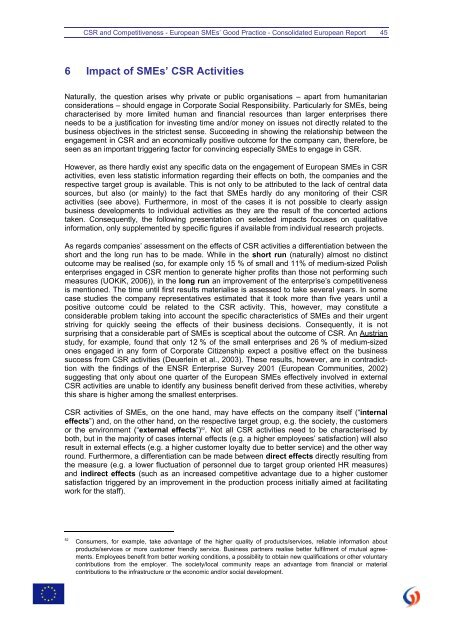CSR and Competitiveness European SMEs - KMU Forschung Austria
CSR and Competitiveness European SMEs - KMU Forschung Austria
CSR and Competitiveness European SMEs - KMU Forschung Austria
You also want an ePaper? Increase the reach of your titles
YUMPU automatically turns print PDFs into web optimized ePapers that Google loves.
<strong>CSR</strong> <strong>and</strong> <strong>Competitiveness</strong> - <strong>European</strong> <strong>SMEs</strong>’ Good Practice - Consolidated <strong>European</strong> Report 45<br />
6 Impact of <strong>SMEs</strong>’ <strong>CSR</strong> Activities<br />
Naturally, the question arises why private or public organisations – apart from humanitarian<br />
considerations – should engage in Corporate Social Responsibility. Particularly for <strong>SMEs</strong>, being<br />
characterised by more limited human <strong>and</strong> financial resources than larger enterprises there<br />
needs to be a justification for investing time <strong>and</strong>/or money on issues not directly related to the<br />
business objectives in the strictest sense. Succeeding in showing the relationship between the<br />
engagement in <strong>CSR</strong> <strong>and</strong> an economically positive outcome for the company can, therefore, be<br />
seen as an important triggering factor for convincing especially <strong>SMEs</strong> to engage in <strong>CSR</strong>.<br />
However, as there hardly exist any specific data on the engagement of <strong>European</strong> <strong>SMEs</strong> in <strong>CSR</strong><br />
activities, even less statistic information regarding their effects on both, the companies <strong>and</strong> the<br />
respective target group is available. This is not only to be attributed to the lack of central data<br />
sources, but also (or mainly) to the fact that <strong>SMEs</strong> hardly do any monitoring of their <strong>CSR</strong><br />
activities (see above). Furthermore, in most of the cases it is not possible to clearly assign<br />
business developments to individual activities as they are the result of the concerted actions<br />
taken. Consequently, the following presentation on selected impacts focuses on qualitative<br />
information, only supplemented by specific figures if available from individual research projects.<br />
As regards companies’ assessment on the effects of <strong>CSR</strong> activities a differentiation between the<br />
short <strong>and</strong> the long run has to be made. While in the short run (naturally) almost no distinct<br />
outcome may be realised (so, for example only 15 % of small <strong>and</strong> 11% of medium-sized Polish<br />
enterprises engaged in <strong>CSR</strong> mention to generate higher profits than those not performing such<br />
measures (UOKiK, 2006)), in the long run an improvement of the enterprise’s competitiveness<br />
is mentioned. The time until first results materialise is assessed to take several years. In some<br />
case studies the company representatives estimated that it took more than five years until a<br />
positive outcome could be related to the <strong>CSR</strong> activity. This, however, may constitute a<br />
considerable problem taking into account the specific characteristics of <strong>SMEs</strong> <strong>and</strong> their urgent<br />
striving for quickly seeing the effects of their business decisions. Consequently, it is not<br />
surprising that a considerable part of <strong>SMEs</strong> is sceptical about the outcome of <strong>CSR</strong>. An <strong>Austria</strong>n<br />
study, for example, found that only 12 % of the small enterprises <strong>and</strong> 26 % of medium-sized<br />
ones engaged in any form of Corporate Citizenship expect a positive effect on the business<br />
success from <strong>CSR</strong> activities (Deuerlein et al., 2003). These results, however, are in contradicttion<br />
with the findings of the ENSR Enterprise Survey 2001 (<strong>European</strong> Communities, 2002)<br />
suggesting that only about one quarter of the <strong>European</strong> <strong>SMEs</strong> effectively involved in external<br />
<strong>CSR</strong> activities are unable to identify any business benefit derived from these activities, whereby<br />
this share is higher among the smallest enterprises.<br />
<strong>CSR</strong> activities of <strong>SMEs</strong>, on the one h<strong>and</strong>, may have effects on the company itself (“internal<br />
effects”) <strong>and</strong>, on the other h<strong>and</strong>, on the respective target group, e.g. the society, the customers<br />
or the environment (“external effects”) 52 . Not all <strong>CSR</strong> activities need to be characterised by<br />
both, but in the majority of cases internal effects (e.g. a higher employees’ satisfaction) will also<br />
result in external effects (e.g. a higher customer loyalty due to better service) <strong>and</strong> the other way<br />
round. Furthermore, a differentiation can be made between direct effects directly resulting from<br />
the measure (e.g. a lower fluctuation of personnel due to target group oriented HR measures)<br />
<strong>and</strong> indirect effects (such as an increased competitive advantage due to a higher customer<br />
satisfaction triggered by an improvement in the production process initially aimed at facilitating<br />
work for the staff).<br />
52 Consumers, for example, take advantage of the higher quality of products/services, reliable information about<br />
products/services or more customer friendly service. Business partners realise better fulfilment of mutual agreements.<br />
Employees benefit from better working conditions, a possibility to obtain new qualifications or other voluntary<br />
contributions from the employer. The society/local community reaps an advantage from financial or material<br />
contributions to the infrastructure or the economic <strong>and</strong>/or social development.




